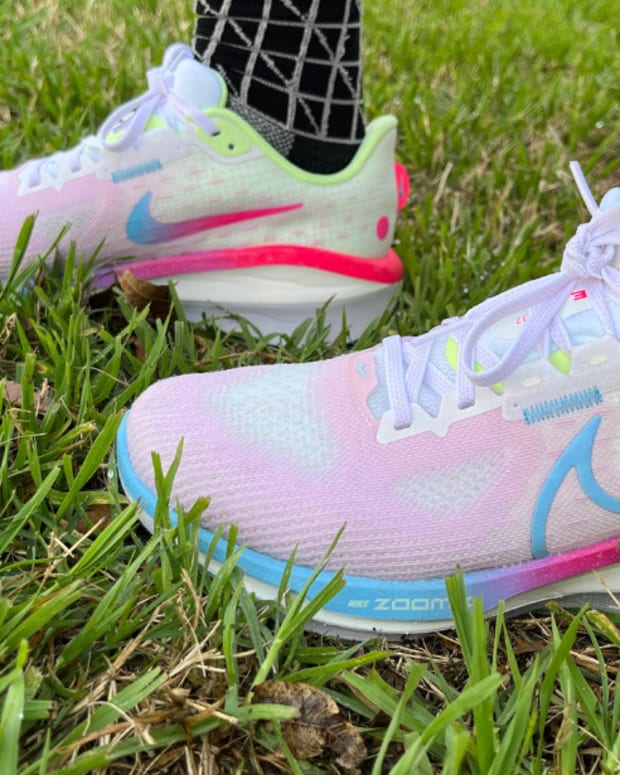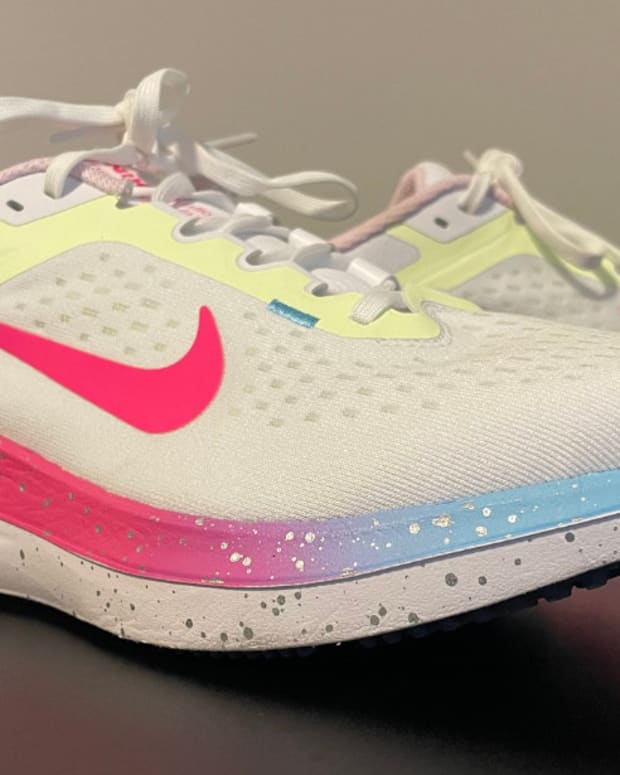The products featured in this article have been independently reviewed. When you buy something through the retail links on this page, we may earn commission at no cost to you, the reader. Sports Illustrated editorial staff are not involved in the creation of this content. Learn more here.
It can be difficult to eat enough fiber, especially if you’re busy and you don’t have much time to cook homemade meals with fiber-rich ingredients. That’s where chia seeds come in.
Chia seeds are seeds that come from Salvia hispanica, a desert plant. They are helpful additions to boosting nutrients in your diet as they are rich in both fiber and omega-3 fatty acids. They can easily be added to nearly any food—from salads and soups to smoothies and desserts, or mixed with the liquid of your choice to make chia pudding.
Here are our favorite chia seed brands of 2024.
Our Picks for the Best Chia Seeds:
- Best Overall Chia Seeds: Viva Naturals Chia Seeds
- Best Organic Chia Seeds: BetterBody Foods Chia Seeds
- Best Bulk Chia Seeds: Yupik Chia Seeds
- Best Ground Chia Seeds: Spectrum Essentials Ground Chia Seed
- Best Chia Seed Blend: BetterBody Foods Super Seeds
- Best Chia Seeds for Smoothies: Terrasoul Superfoods Chia Seeds
Best Overall Chia Seeds: Viva Naturals Chia Seeds
Key features & specs
- Percent of daily value: 14 percent dietary fiber
- Nutrition facts: 70 calories, 4.5 grams fat, four grams carbohydrates, four grams fiber, three grams protein
- Certifications: USDA Organic, Keto Certified, Certified Paleo, Certified Gluten Free, Vegan, Non-GMO Project Verified
- Price per serving: $0.20
- Servings per container: 69
Chia seeds are an extremely balanced food, providing a mix of protein, fiber and healthy omega-3 fats. These seeds are a great addition to baked goods, salads or smoothies, and thanks to their soluble fiber content they can even be made into a healthy, fiber-rich pudding.
The chia seeds from Viva Naturals are also certified organic, non-GMO, gluten-free, vegan, keto and paleo so you can be sure they’re a fit for your lifestyle and dietary needs.
Reviewers also like that these chia seeds are really affordable, but be aware that people who are allergic to tree nuts may need to avoid this product because it could be cross-contaminated with coconut.
Pros:
- Fiber-rich
- Organic and non-GMO
- Affordable
Cons:
- Potential cross-contamination with coconut
Best Organic Chia Seeds: BetterBody Foods Chia Seeds
Key features & specs
- Percent of daily value: 37 percent dietary fiber, 15 percent calcium, 15 percent iron
- Nutrition facts: 150 calories, nine grams fat, 13 grams carbohydrate, 10 grams fiber, five grams protein
- Certifications: USDA Organic, Non-GMO Project Verified, Gluten-Free
- Price per serving: $0.42
- Servings per container: 30
BetterBody Foods’ organic chia seeds are an excellent choice if you want a high-quality product. These chia seeds are USDA Organic certified and verified GMO-free by the Non-GMO Project.
These seeds also have over 88,000 reviews averaging 4.7 stars on Amazon. However, some reviewers say their container had some other plant matter inside, like small twigs—so you may want to rinse your chia seeds before you use them.
Pros:
- USDA Organic certified
- Highly rated
- Non-GMO Project Verified
Cons:
- May contain some plant matter
Best Bulk Chia Seeds: Yupik Chia Seeds
Key features & specs
- Percent of daily value: 36 percent fiber, 15 percent calcium, 10 percent iron
- Nutrition facts: 150 calories, 9 grams fat, 13 grams carbohydrates, 10 grams dietary fiber
- Certifications: Certified Gluten-Free
- Price per serving: $0.32
- Servings per container: 33
If chia seeds are a daily staple in your house, it makes sense to purchase them in bulk. These chia seeds from Yupik are available in a standard 2.2-pound bag, but you can also purchase a six-pack of these bags if you want to stock up.
These chia seeds aren’t organic, but they are certified gluten-free. They may also contain traces of peanuts, tree nuts, coconut and soy—so they aren’t safe for people with these food allergies. Reviewers like the tremendous value this bulk option provides.
Pros:
- Available for bulk purchases
- Affordable
- Certified gluten-free
Cons:
- May contain traces of peanuts, tree nuts, coconuts, and soy
Best Ground Chia Seeds: Spectrum Essentials Ground Chia Seed
Key features & specs
- Percent of daily value: 17 percent fiber, 8 percent calcium, 6 percent iron, 10 percent magnesium
- Nutrition facts: 60 calories, 3.5 grams fat, 5 grams carbohydrates, 4 grams fiber, 2 grams protein
- Certifications: USDA Organic, Fair Trade Certified, Non-GMO Project Verified
- Price per serving: $0.46
- Servings per container: 24
If you dislike chia seeds getting stuck in your teeth, or want to use chia in baking as a substitute for or a high-fiber addition to flour, you’ll want to choose ground chia seeds. These ground chia seeds from Spectrum Essentials are ready to use for baking projects and can be used in all the same ways as whole chia seeds, as well.
Reviewers love this ground chia seed for omega-3 and fiber supplementation. However, it’s significantly more expensive than whole chia seeds.
Pros:
- Pre-ground for baking or easy mixing
- Organic and non-GMO
- Rich in fiber and omega-3
Cons:
- More expensive than whole chia seeds
Best Chia Seed Blend: BetterBody Foods Super Seeds
Key features & specs
- Percent of daily value: 30 percent fiber, 10 percent calcium, 15 percent iron
- Nutrition facts: 150 calories, 11 grams fat, 10 grams carbohydrates, 8 grams fiber
- Certifications: USDA Organic, Non-GMO Project Verified, Gluten Free, Kosher
- Price per serving: $0.66
- Servings per container: 30
Seeds are a great way to boost your nutrition, and choosing a seed blend allows you to easily and conveniently experience the benefits of several different types of seeds. This Super Seeds blend from BetterBody Foods contains chia seeds, flaxseed meal and hulled hemp seeds to provide an easy fiber, protein and omega-3 boost to any meal.
Although this seed blend is more expensive than chia seeds alone, reviewers say that it has a great flavor and texture.
Pros:
- USDA Organic and Non-GMO Project Verified
- Blend of chia seeds, flax seeds, and hemp seeds
- Highly rated for flavor
Cons:
- More expensive than chia seeds alone
Best Chia Seeds for Smoothies: Terrasoul Superfoods Chia Seeds
Key features & specs
- Percent of daily value: 11 percent fiber, 6 percent calcium, 6 percent iron, 8 percent magnesium
- Nutrition facts: 60 calories, 4 grams fat, 5 grams carbohydrates, 3 grams dietary fiber, 2 grams protein
- Certifications: USDA Organic, Non-GMO Project Verified
- Price per serving: $0.19
- Servings per container: 94
If you have a morning smoothie habit, a tablespoon of chia seeds is a nutritious addition. These organic raw chia seeds from Terrasoul Superfoods are very inexpensive, making them ideal for daily use. They also come in a large 2.5-pound bag, so you’ll be able to make plenty of smoothies before your reorder.
These organic black chia seeds have overwhelmingly positive reviews on Amazon, but some reviewers say that the bag they arrive in doesn’t seal very well.
Pros:
- Large 2.5-pound bag
- Inexpensive
- USDA Organic and Non-GMO Project Verified
Cons:
- Reviewers say the bag doesn’t seal well
What are Chia Seeds?
Chia seeds are the tiny seeds of the chia plant, Salvia hispanica.
Because they’re rich in fiber, healthy omega-3 supplements and nutrients, chia seeds are commonly used to add a healthful boost to smoothies, meal-replacement shakes, oatmeal, granola, yogurt and other foods.
How to Eat Chia Seeds
Chia seeds are extremely versatile. You can eat them raw, cooked, dry or soaked in liquid.
When added to foods dry, as a topping or a mix-in, they add a bit of crunch.
However, you can also soak them in liquid (like milk or plant-based milk) and they will start to gel—making a thick, pudding texture. For this reason, many people use them to make chia pudding as an easy breakfast or dessert. Common chia pudding ingredients include milk or plant-based milk, honey or maple syrup, protein powder and fresh fruit.
Benefits of Chia Seeds
Although they’re tiny, chia seeds are packed with health benefits.
First, they are rich in fiber—particularly soluble fiber. Soluble fiber swells and turns into a gel in the presence of water, making it helpful for constipation. This high soluble fiber content is also while the seeds themselves gel in the presence of liquid.
Fiber is also filling, making chia seeds a helpful addition to your diet if you’re trying to lose weight.
Chia seeds also contain anti-inflammatory omega-3 fats. Most people are eating too much omega-6 fat and not enough omega-3, so adding chia seeds to your meals may help correct that balance to help reduce inflammation and improve overall health.
Chia seeds also contain antioxidants, which may help to optimize cellular health by neutralizing harmful free radical compounds.
Finally, chia seeds are a plant-based source of some minerals, like calcium and iron. It can be difficult to get enough of these minerals on plant-based diets, so chia seeds are an excellent addition to your diet if you’re a vegan or vegetarian.
How to Choose the Best Chia Seeds for You
Most chia seeds are pretty similar. Still, there are a few things you should consider when shopping for chia seeds.
First, if it’s important to you, look for organic chia seeds. Several brands are USDA Organic and Non-GMO Project Certified, but some are not.
Additionally, you may want to consider the form you use. If you’re making chia pudding or adding chia to smoothies, whole seeds may be best. If you want to use chia seeds for baking, ground chia seeds may be a better choice.
How We Chose the Best Chia Seeds
We chose these chia seed brands based on several factors. First, we considered brand reputation and customer reviews. We chose mostly products that featured third-party certifications, such as USDA Organic, Non-GMO Project Verified or verified gluten-free.
Additionally, we included chia seeds at a variety of price points. We also included a seed blend and a ground chia seed option for people who may be seeking something other than plain, whole chia seeds.
Best Chia Seeds FAQs
How many chia seeds should you eat per day?
Most people probably shouldn’t eat more than a few tablespoons per day. If you’re new to eating chia seeds, start with one tablespoon per day and gradually increase over time. Eating too much fiber when you’re not used to it may cause digestive symptoms like gas, cramps and bloating.
Do you need to soak chia seeds before eating?
No, you don’t have to soak chia seeds before you eat them. Soaking them makes them become soft and gelatinous, while eating them without soaking leaves them crunchy. However, soaking chia seeds before eating them may make it easier to digest and absorb the nutrients in the seeds.
What is the difference between black and white chia seeds?
The only difference between black and white chia seeds is the color. They are nutritionally very similar. Black chia seeds are the most commonly available chia seeds to buy.
Takeaway: Are Chia Seeds Worth the Money?
Chia seeds are a versatile, nutrition-packed food. They are packed with fiber, omega-3 fats and essential nutrients like iron and calcium, and may be helpful for inflammation, weight loss and digestion. Most of the chia seeds you can purchase are organic and non-GMO, too. If you need a quick and easy fiber boost, chia seeds will be a great addition to your pantry.
Prices are accurate and items in stock as of publish time.















